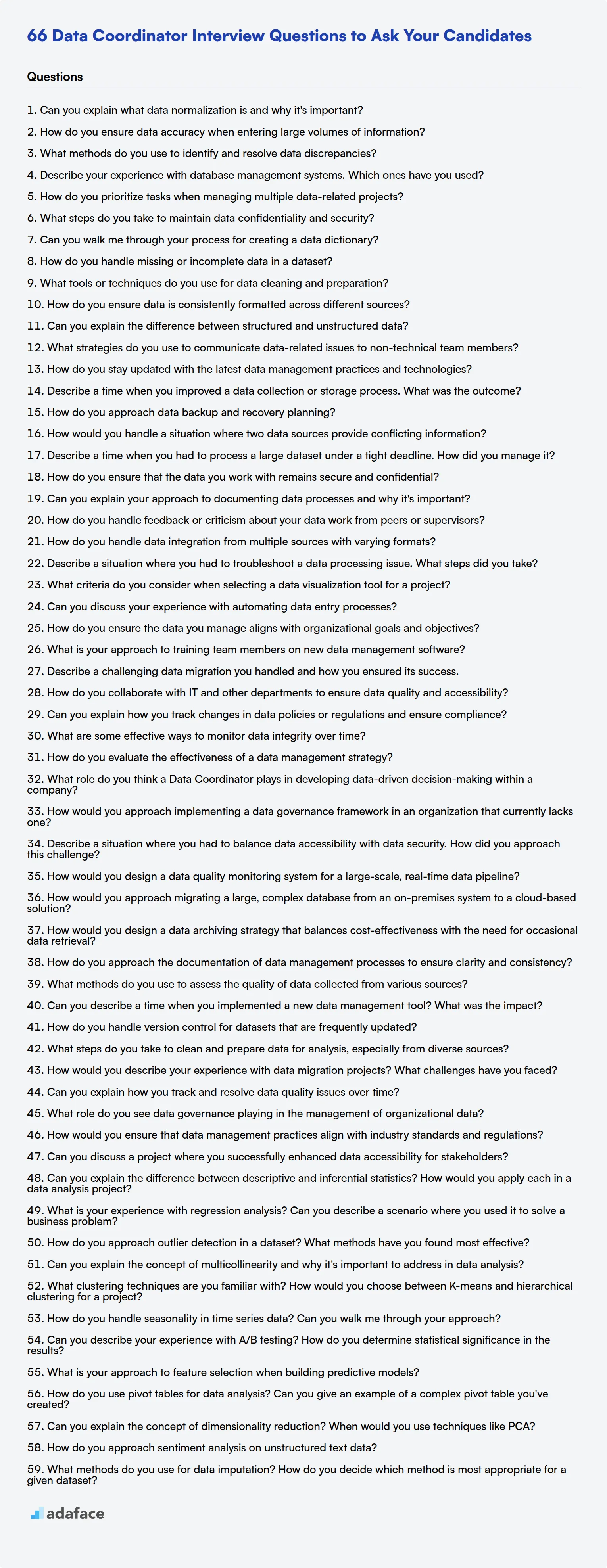Hiring the right Data Coordinator is crucial for maintaining accurate and efficient data management within an organization. Asking the right interview questions helps you identify candidates with the necessary skills and experience to excel in this role.
This blog post provides a comprehensive list of Data Coordinator interview questions, ranging from basic to advanced levels. We've also included questions specifically related to data management processes and analysis techniques to help you thoroughly evaluate candidates.
By using these questions, you can assess candidates' technical knowledge, problem-solving abilities, and communication skills. Additionally, consider using a pre-interview data analysis assessment to streamline your hiring process and identify top performers more effectively.
Table of contents
15 basic Data Coordinator interview questions and answers to assess candidates
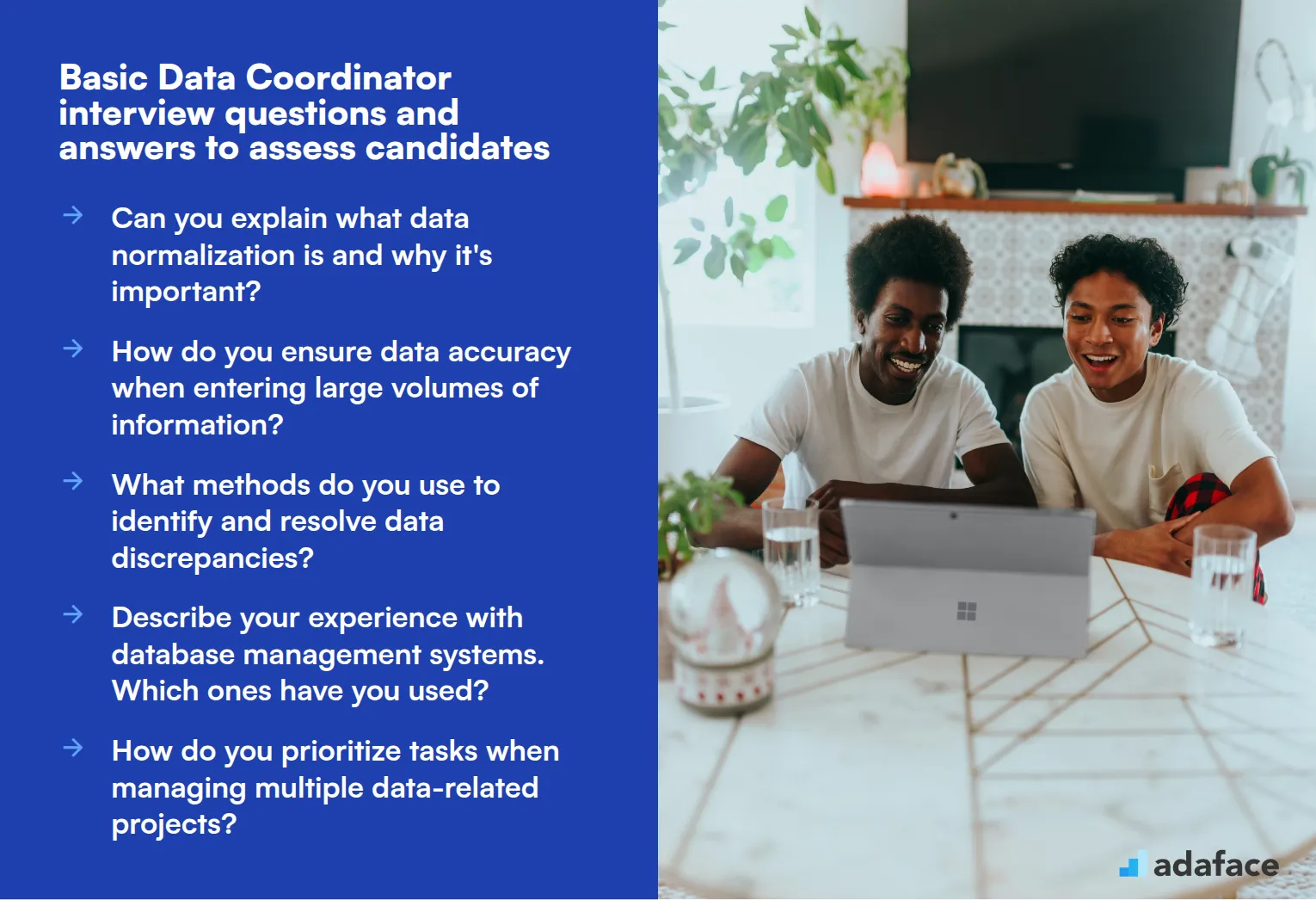
To effectively assess candidates for the Data Coordinator role, use these 15 basic interview questions. These questions are designed to evaluate a candidate's fundamental understanding of data management, organizational skills, and technical aptitude. Use them as a starting point to gauge the applicant's suitability for the position.
- Can you explain what data normalization is and why it's important?
- How do you ensure data accuracy when entering large volumes of information?
- What methods do you use to identify and resolve data discrepancies?
- Describe your experience with database management systems. Which ones have you used?
- How do you prioritize tasks when managing multiple data-related projects?
- What steps do you take to maintain data confidentiality and security?
- Can you walk me through your process for creating a data dictionary?
- How do you handle missing or incomplete data in a dataset?
- What tools or techniques do you use for data cleaning and preparation?
- How do you ensure data is consistently formatted across different sources?
- Can you explain the difference between structured and unstructured data?
- What strategies do you use to communicate data-related issues to non-technical team members?
- How do you stay updated with the latest data management practices and technologies?
- Describe a time when you improved a data collection or storage process. What was the outcome?
- How do you approach data backup and recovery planning?
8 Data Coordinator interview questions and answers to evaluate junior coordinators
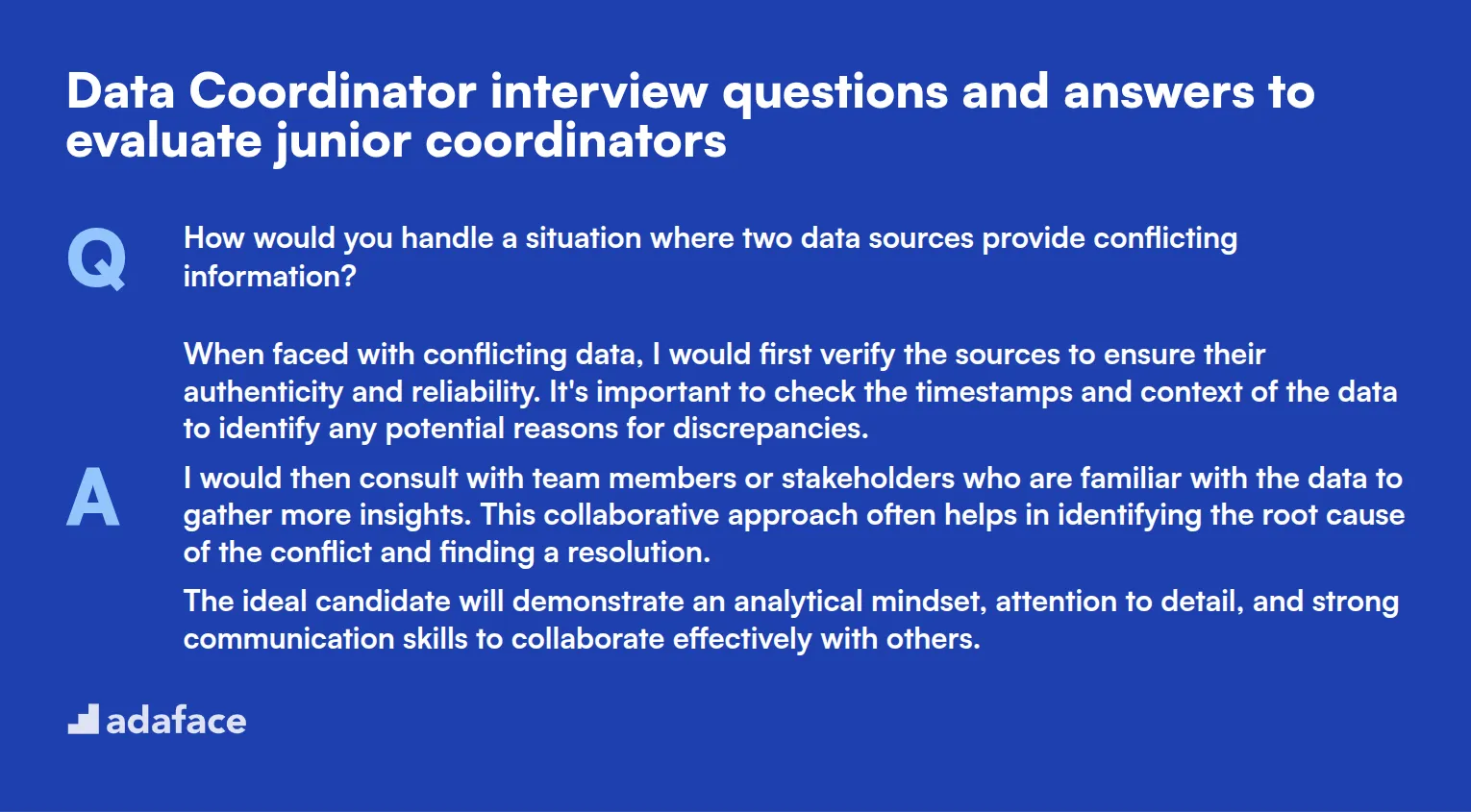
To effectively assess junior Data Coordinators, it's essential to ask questions that gauge their practical understanding of data management. This curated list of questions will help you discern whether candidates possess the necessary skills to manage data accurately and efficiently.
1. How would you handle a situation where two data sources provide conflicting information?
When faced with conflicting data, I would first verify the sources to ensure their authenticity and reliability. It's important to check the timestamps and context of the data to identify any potential reasons for discrepancies.
I would then consult with team members or stakeholders who are familiar with the data to gather more insights. This collaborative approach often helps in identifying the root cause of the conflict and finding a resolution.
The ideal candidate will demonstrate an analytical mindset, attention to detail, and strong communication skills to collaborate effectively with others.
2. Describe a time when you had to process a large dataset under a tight deadline. How did you manage it?
I recall a project where I was tasked with processing a large dataset with a tight deadline. I prioritized the tasks by breaking down the dataset into manageable chunks and using data processing tools to automate parts of the task.
I focused on maintaining data accuracy by conducting regular checks and validations at each step of the process. This ensured that the final output was both timely and error-free.
Look for candidates who display strong organizational skills, the ability to prioritize, and familiarity with data processing tools.
3. How do you ensure that the data you work with remains secure and confidential?
To ensure data security and confidentiality, I adhere to company policies and industry standards for data protection. This includes using encryption, password protection, and secure access protocols.
Regularly updating software and conducting security audits are also part of my routine to identify and mitigate potential vulnerabilities.
Candidates should show an understanding of data security principles and demonstrate a proactive approach to maintaining data confidentiality.
4. Can you explain your approach to documenting data processes and why it's important?
Documenting data processes involves creating a clear and detailed record of data workflows, transformations, and handling procedures. This ensures that any team member can understand and replicate the processes if needed.
Documentation is crucial for maintaining consistency, facilitating training, and ensuring compliance with industry regulations.
An ideal candidate will emphasize the importance of clear documentation and show experience in creating or improving documentation for data processes. Learn more about the skills required for data coordinators.
5. How do you handle feedback or criticism about your data work from peers or supervisors?
I view feedback as a valuable opportunity for growth and improvement. When receiving feedback, I listen actively and ask clarifying questions to fully understand the concerns or suggestions being made.
I then reflect on the feedback to identify areas for improvement and implement changes to enhance the quality of my work.
Look for candidates who are open to feedback, demonstrate a growth mindset, and are willing to adapt their practices for better outcomes.
12 intermediate Data Coordinator interview questions and answers to ask mid-tier coordinators
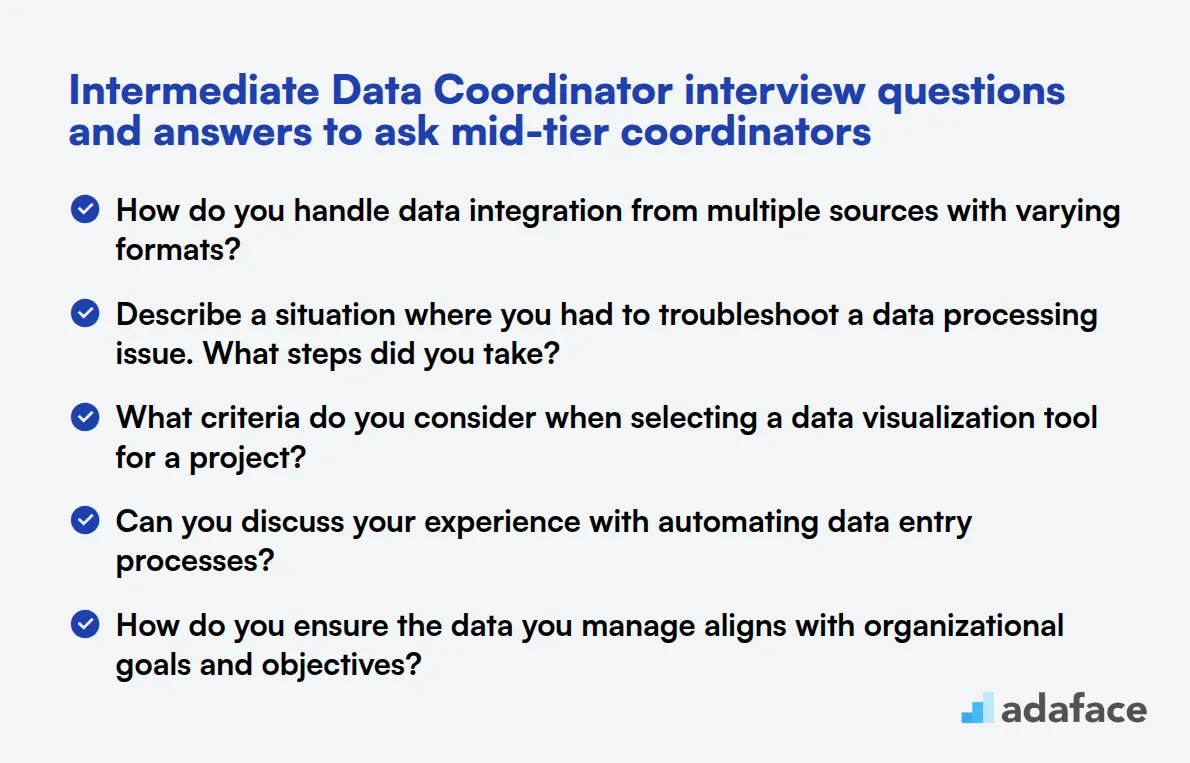
To assess if candidates have the right skills for mid-tier data coordination, ask them some of these intermediate Data Coordinator interview questions. These questions help you evaluate their practical knowledge and problem-solving abilities, ensuring they're ready to tackle more complex tasks.
- How do you handle data integration from multiple sources with varying formats?
- Describe a situation where you had to troubleshoot a data processing issue. What steps did you take?
- What criteria do you consider when selecting a data visualization tool for a project?
- Can you discuss your experience with automating data entry processes?
- How do you ensure the data you manage aligns with organizational goals and objectives?
- What is your approach to training team members on new data management software?
- Describe a challenging data migration you handled and how you ensured its success.
- How do you collaborate with IT and other departments to ensure data quality and accessibility?
- Can you explain how you track changes in data policies or regulations and ensure compliance?
- What are some effective ways to monitor data integrity over time?
- How do you evaluate the effectiveness of a data management strategy?
- What role do you think a Data Coordinator plays in developing data-driven decision-making within a company?
9 advanced Data Coordinator interview questions and answers to evaluate senior coordinators
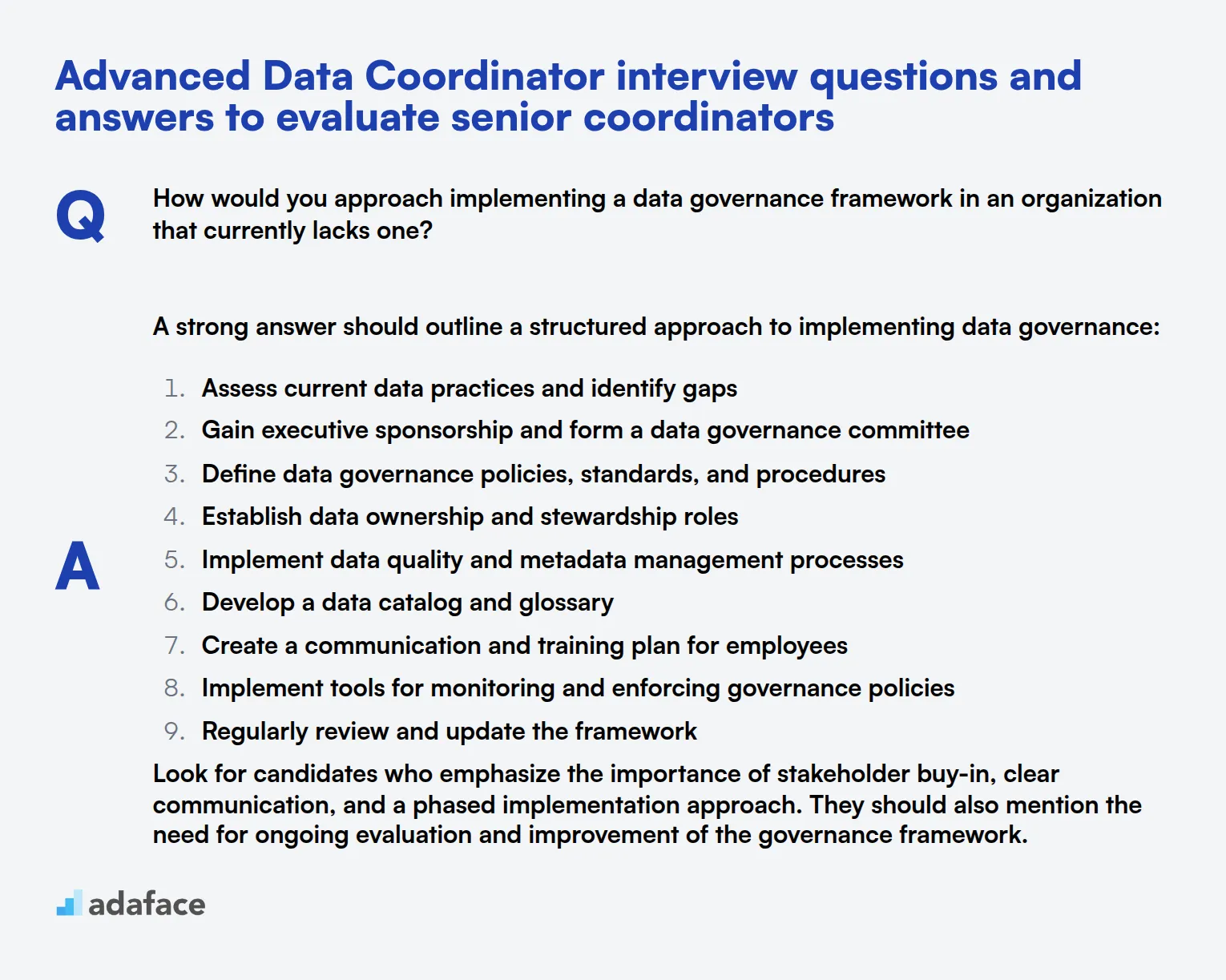
When evaluating senior Data Coordinators, it's crucial to delve deeper into their expertise and problem-solving abilities. These advanced questions will help you assess candidates' strategic thinking and their capacity to handle complex data challenges. Use this list to identify top-tier talent who can elevate your data management processes.
1. How would you approach implementing a data governance framework in an organization that currently lacks one?
A strong answer should outline a structured approach to implementing data governance:
- Assess current data practices and identify gaps
- Gain executive sponsorship and form a data governance committee
- Define data governance policies, standards, and procedures
- Establish data ownership and stewardship roles
- Implement data quality and metadata management processes
- Develop a data catalog and glossary
- Create a communication and training plan for employees
- Implement tools for monitoring and enforcing governance policies
- Regularly review and update the framework
Look for candidates who emphasize the importance of stakeholder buy-in, clear communication, and a phased implementation approach. They should also mention the need for ongoing evaluation and improvement of the governance framework.
2. Describe a situation where you had to balance data accessibility with data security. How did you approach this challenge?
An ideal response should demonstrate the candidate's ability to navigate the delicate balance between data accessibility and security:
• Implemented role-based access control (RBAC) to ensure users only had access to data necessary for their job functions • Used data masking techniques to protect sensitive information while still allowing access to non-sensitive parts of the dataset • Implemented multi-factor authentication for accessing critical data systems • Set up audit trails to monitor data access and usage patterns • Regularly reviewed and updated access permissions to maintain the principle of least privilege
Look for candidates who show an understanding of both technical solutions and policy-based approaches. They should also mention the importance of regular security audits and staying updated with data protection regulations.
3. How would you design a data quality monitoring system for a large-scale, real-time data pipeline?
A comprehensive answer should cover the following key aspects:
- Define data quality metrics (e.g., completeness, accuracy, consistency, timeliness)
- Implement automated data profiling at various stages of the pipeline
- Set up real-time data validation rules and checks
- Use statistical process control techniques to detect anomalies
- Implement a dashboard for visualizing data quality metrics in real-time
- Set up alerts for when data quality falls below defined thresholds
- Establish a feedback loop for continuous improvement of data quality rules
Evaluate the candidate's understanding of both technical implementation and the importance of defining clear, measurable data quality standards. Look for mentions of scalability considerations and the ability to handle high-volume, high-velocity data streams.
4. How would you approach migrating a large, complex database from an on-premises system to a cloud-based solution?
A strong answer should outline a structured migration approach:
- Assess the current database architecture and identify dependencies
- Choose the appropriate cloud platform and database service
- Design the new cloud-based database architecture
- Develop a detailed migration plan, including timelines and rollback procedures
- Set up a staging environment for testing
- Implement data replication to keep the on-premises and cloud databases in sync during migration
- Perform thorough testing, including performance and security tests
- Plan for downtime and communicate with stakeholders
- Execute the migration in phases or all at once, depending on the situation
- Verify data integrity post-migration
- Optimize the cloud database for performance and cost
Look for candidates who emphasize the importance of thorough planning, risk mitigation, and post-migration optimization. They should also mention considerations for data security and compliance during the migration process.
5. How would you design a data archiving strategy that balances cost-effectiveness with the need for occasional data retrieval?
An effective answer should cover the following key points:
- Classify data based on importance, frequency of access, and regulatory requirements
- Implement a tiered storage system (e.g., hot, warm, cold storage)
- Use data compression and deduplication techniques to reduce storage costs
- Implement automated archiving policies based on data age and usage patterns
- Ensure proper indexing and metadata management for efficient data retrieval
- Use cloud storage solutions for cost-effective long-term archiving
- Implement data lifecycle management policies
- Ensure compliance with data retention regulations
- Regularly review and update the archiving strategy
Evaluate the candidate's ability to balance cost considerations with data accessibility needs. Look for mentions of specific archiving technologies and their understanding of regulatory requirements related to data retention.
10 Data Coordinator questions related to data management processes
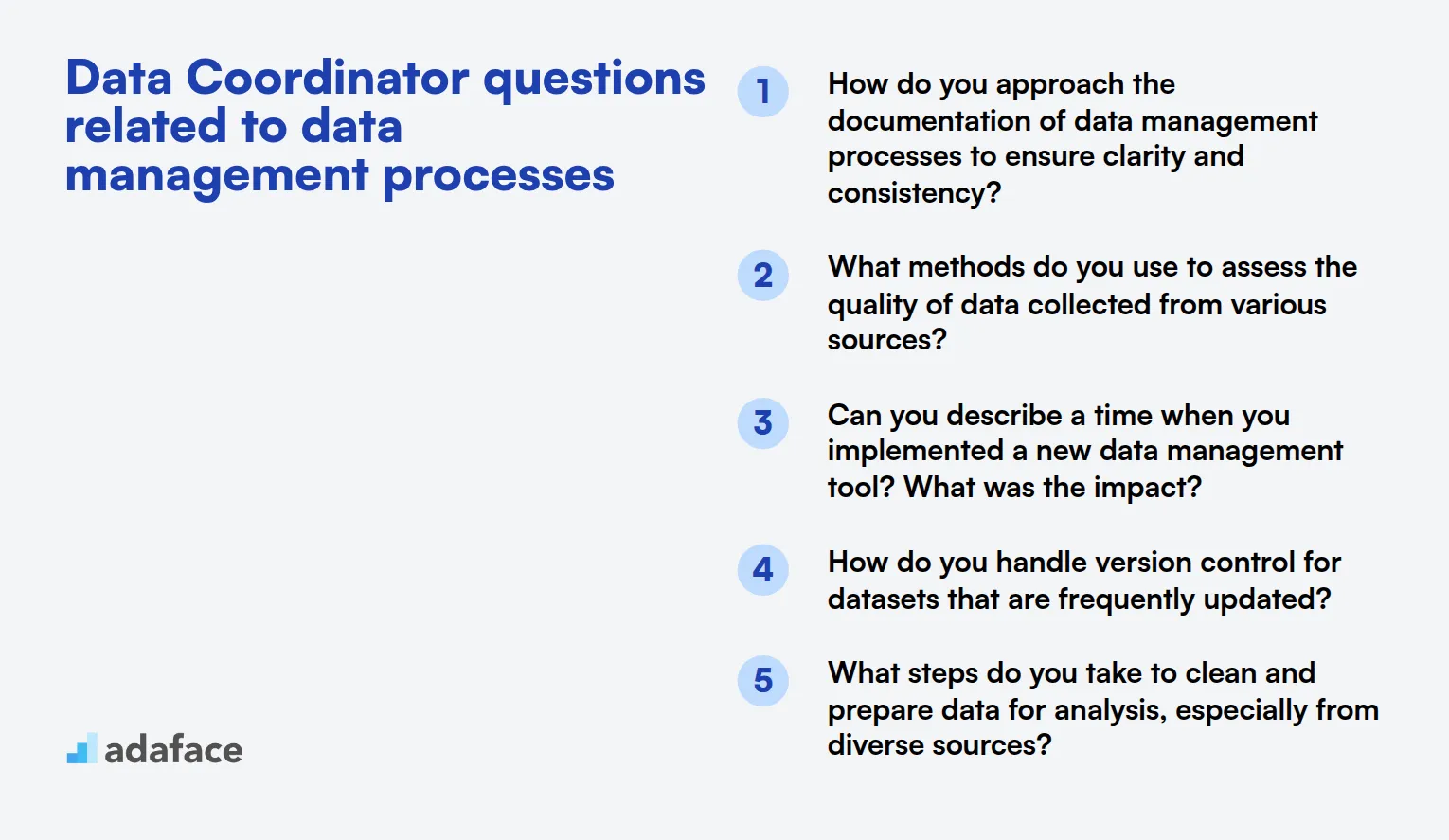
To assess whether candidates have a strong grasp of data management processes, consider using these targeted questions. They can help you uncover practical skills and insights essential for a Data Coordinator role, providing clarity on how applicants tackle critical data challenges in the workplace. For more details on job expectations, check out our data coordinator job description.
- How do you approach the documentation of data management processes to ensure clarity and consistency?
- What methods do you use to assess the quality of data collected from various sources?
- Can you describe a time when you implemented a new data management tool? What was the impact?
- How do you handle version control for datasets that are frequently updated?
- What steps do you take to clean and prepare data for analysis, especially from diverse sources?
- How would you describe your experience with data migration projects? What challenges have you faced?
- Can you explain how you track and resolve data quality issues over time?
- What role do you see data governance playing in the management of organizational data?
- How would you ensure that data management practices align with industry standards and regulations?
- Can you discuss a project where you successfully enhanced data accessibility for stakeholders?
12 Data Coordinator questions related to data analysis techniques
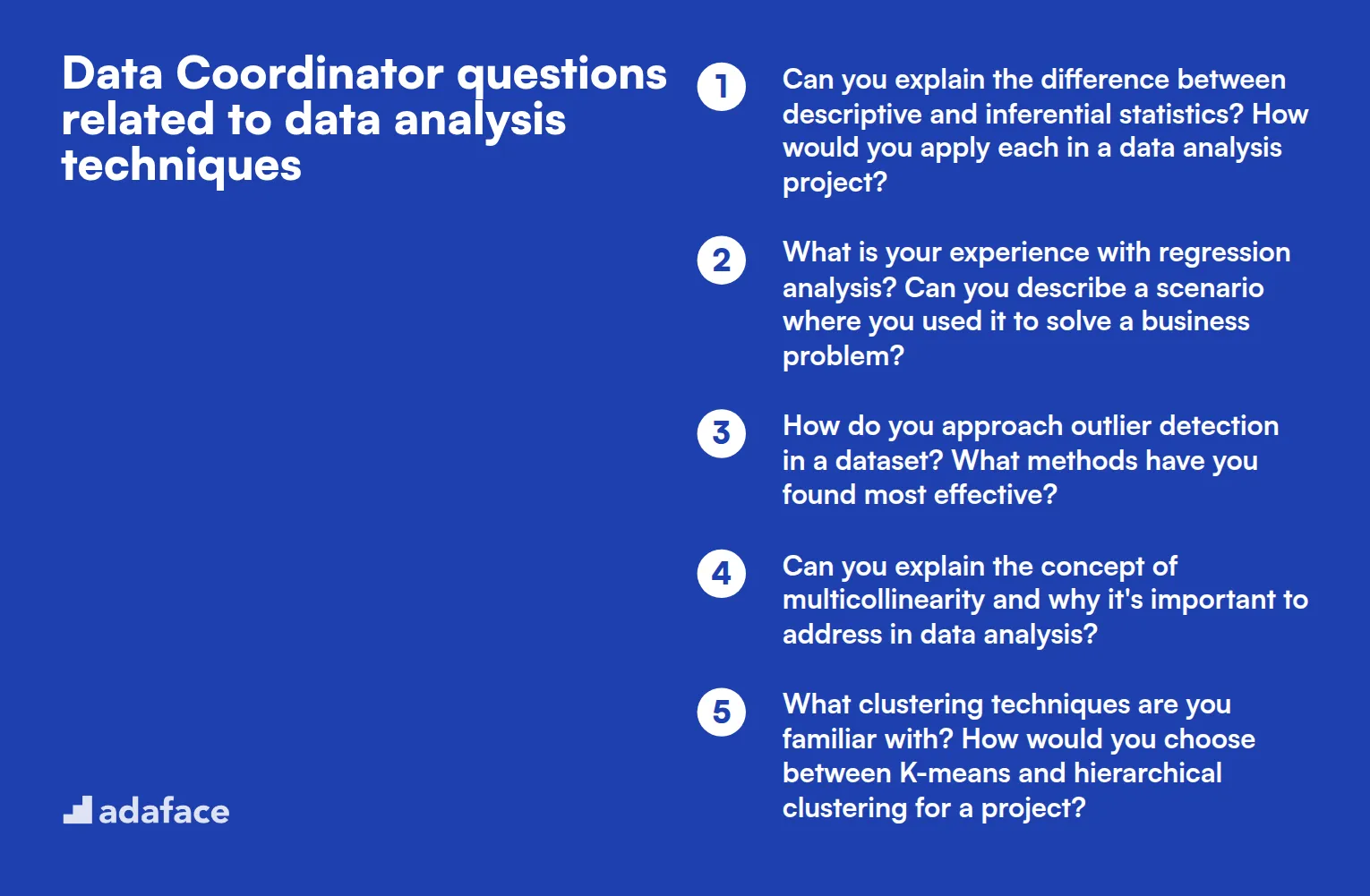
To assess a candidate's proficiency in data analysis techniques, use these 12 interview questions. They will help you evaluate the applicant's ability to handle complex data tasks and their understanding of key analytical concepts essential for a Data Coordinator role.
- Can you explain the difference between descriptive and inferential statistics? How would you apply each in a data analysis project?
- What is your experience with regression analysis? Can you describe a scenario where you used it to solve a business problem?
- How do you approach outlier detection in a dataset? What methods have you found most effective?
- Can you explain the concept of multicollinearity and why it's important to address in data analysis?
- What clustering techniques are you familiar with? How would you choose between K-means and hierarchical clustering for a project?
- How do you handle seasonality in time series data? Can you walk me through your approach?
- Can you describe your experience with A/B testing? How do you determine statistical significance in the results?
- What is your approach to feature selection when building predictive models?
- How do you use pivot tables for data analysis? Can you give an example of a complex pivot table you've created?
- Can you explain the concept of dimensionality reduction? When would you use techniques like PCA?
- How do you approach sentiment analysis on unstructured text data?
- What methods do you use for data imputation? How do you decide which method is most appropriate for a given dataset?
Which Data Coordinator skills should you evaluate during the interview phase?
While it's impossible to gauge a candidate's full potential in a single interview, evaluating certain core skills can offer substantial insight into a Data Coordinator's capabilities. These skills are integral to the role and help in determining whether a candidate can effectively manage data processes and collaborate efficiently.
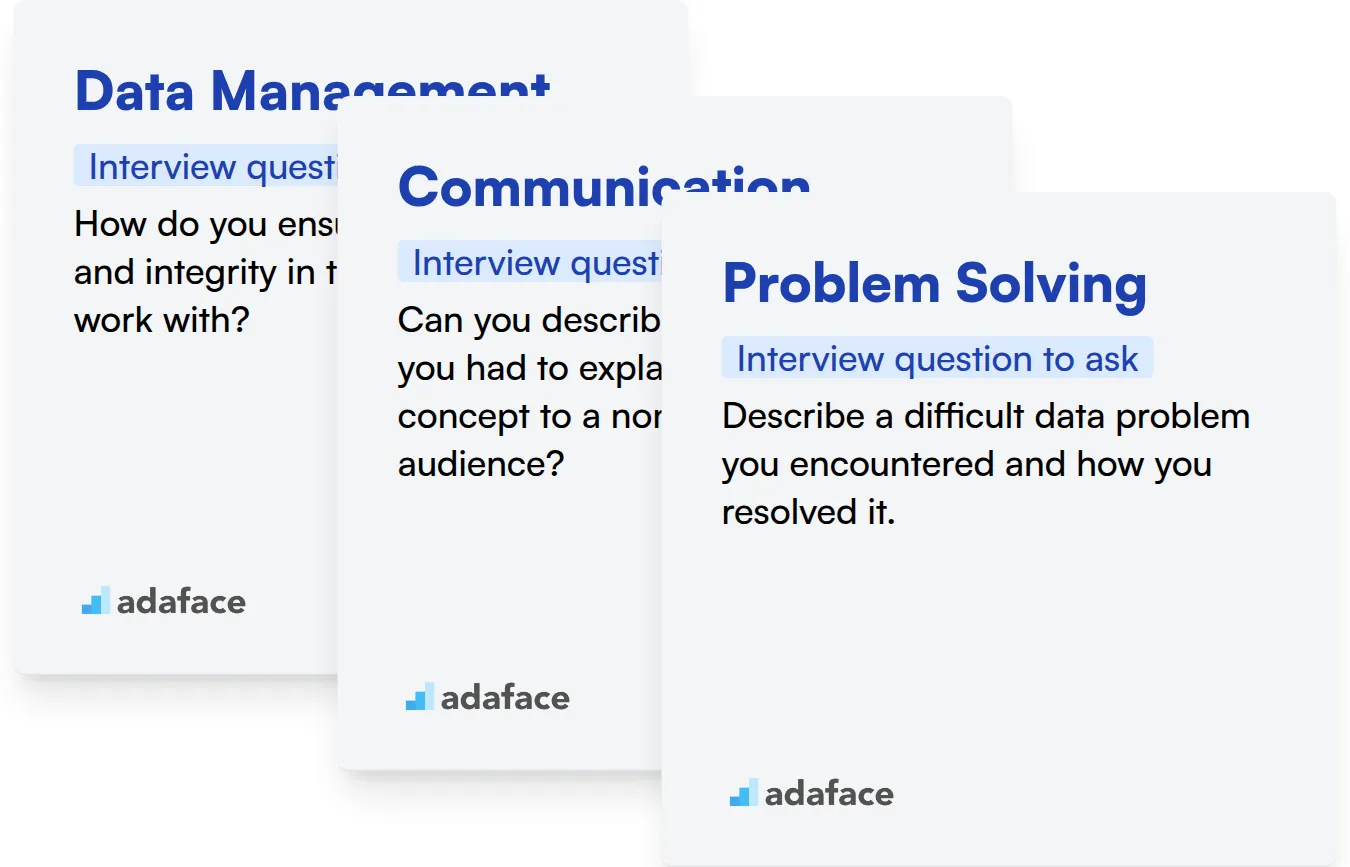
Data Management
To assess this skill in an interview, it is beneficial to ask questions that explore the candidate's experience and understanding of data management practices.
How do you ensure data accuracy and integrity in the systems you work with?
Listen for responses that detail methodologies and tools used for maintaining data accuracy, such as data validation processes, audit trails, and regular data cleaning activities.
Communication
Utilizing a Communication skills assessment, which includes relevant MCQs, can help evaluate a candidate's ability to articulate data insights clearly. Our Communication test can be a useful resource for this.
In the interview, pose questions that reveal how candidates convey complex data to various stakeholders.
Can you describe a time when you had to explain a complex data concept to a non-technical audience?
Look for examples where the candidate effectively simplified complex information, demonstrating their ability to tailor communication to different audiences.
Problem Solving
An assessment focusing on Problem Solving skills with targeted MCQs can help filter candidates adept at resolving data issues. Consider using our Critical Thinking test for this purpose.
Ask questions in the interview that uncover how candidates approach and solve data-related problems.
Describe a difficult data problem you encountered and how you resolved it.
Look for structured approaches to problem-solving, including the steps taken to identify the issue, evaluate options, and implement a solution.
3 tips for using Data Coordinator interview questions
Before you start conducting interviews, here are our tips to help you put what you've learned into practice effectively.
1. Incorporate skill tests into your hiring process
Skill tests provide an objective way to assess candidates' abilities before they reach the interview stage. This ensures that only qualified candidates proceed, saving time and resources.
Consider using tests from our library such as the data analysis test, data entry test, and data mining test to evaluate specific skills required for a Data Coordinator role.
These tests help identify areas where candidates excel or may need improvement. By using them, you can focus interviews on discussing candidates' strengths and how they align with the role, leading to more productive interviews.
2. Strategically compile your interview questions
Time during interviews is limited, so it's important to choose the right questions that will give you the most insight. Focus on questions that evaluate the most relevant skills and attributes for the Data Coordinator role.
Complement your data coordinator questions with those related to data analysis or management by using questions from our data-structure interview questions or data-analysis interview questions.
Including questions from other relevant skill areas not only broadens the scope of evaluation but also provides a more comprehensive understanding of the candidate's capabilities.
3. Ask follow-up questions to gauge depth
While predefined questions provide a good starting point, follow-up questions help uncover the depth of candidates' knowledge and understanding. They can reveal whether a candidate is genuinely proficient or just superficially informed.
For example, if you ask a Data Coordinator about their experience with data analysis tools, follow up by asking how they handled a specific data issue. This helps evaluate problem-solving abilities and practical application of skills, ensuring the candidate's fit for the role.
Hire skilled Data Coordinators with interview questions and skills tests
To hire a Data Coordinator with the right skills, it's important to assess their abilities accurately. The most effective way to do this is by using skill tests. Consider using our Data Analysis Test or Data Entry Test to evaluate candidates' proficiency.
After using these tests to shortlist the best applicants, you can invite them for interviews. To streamline your hiring process and find top talent, check out our Online Assessment Platform. It offers a range of tools to help you make informed hiring decisions.
Data Analysis Test
Download Data Coordinator interview questions template in multiple formats
Data Coordinator Interview Questions FAQs
Key skills include data management, attention to detail, analytical skills, and strong communication abilities.
Interview questions can assess a candidate's knowledge, skills, and fit for the position, ensuring a suitable hire.
Look for basic understanding of data systems, eagerness to learn, and strong organizational skills.
Advanced questions focus on complex problem-solving, leadership experiences, and strategic data management.
Experience in data analysis helps a Data Coordinator interpret and present data effectively, aiding decision-making.
Structured questions provide consistency, focus, and the ability to compare candidates fairly.

40 min skill tests.
No trick questions.
Accurate shortlisting.
We make it easy for you to find the best candidates in your pipeline with a 40 min skills test.
Try for freeRelated posts
Free resources




